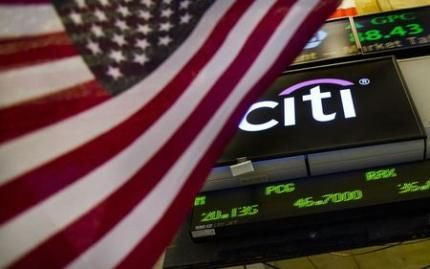Citi, U.S. $7 Billion Settlement Announcement Expected Monday

NEW YORK (Reuters) -- Citigroup agreed to pay $7 billion to resolve a U.S. government investigation into shoddy mortgage-backed securities the bank sold in the run-up to the 2008 financial crisis in a settlement set to be announced on Monday, sources said.
The $7 billion includes $4 billion in cash to the U.S. Department of Justice, $2.5 billion in consumer relief, more than $200 million to the Federal Deposit Insurance Corp. and just under $300 million to settle probes by five states, said sources familiar with the negotiations.
Spokespeople for the Justice Department and the bank declined comment. Representatives of attorneys general of New York, Delaware, California, Massachusetts and Illinois, the states said to be involved, did not immediately return requests for comment. Nor did the FDIC.
The settlement, signed during the weekend, caps months of negotiations, during which the government demanded $12 billion and threatened to sue Citigroup, according to the sources.
The deal is scheduled to be announced Monday morning when Citigroup executives also will report second-quarter results before the stock market opens in New York, the sources said.
The $7 billion has surprised stock analysts and people inside the bank, who expected Citigroup to resolve the investigations for much less.
Citigroup is the second major bank to settle with authorities since President Barack Obama ordered the formation of a task force to investigate the sale and packaging of toxic home loans, which were at the center of the 2008 financial crisis. The Justice Department issued more than a dozen subpoenas to financial institutions in early 2012.
Bank of America Corp. also has been negotiating with the Justice Department over similar claims.
JPMorgan Chase & Co , the largest U.S. bank, last year agreed to pay $13 billion to settle government inquiries into the packaging of toxic mortgages, including by Bear Stearns and Washington Mutual, which the bank acquired during the crisis.
The $13 billion JPMorgan accord was comprised of a $2 billion penalty to the Justice Department, $4 billion in consumer relief, $4 billion to the Federal Housing Finance Agency, and $3 billion to other authorities.
Citigroup's penalty to the Justice Department is twice what JPMorgan paid, though it had handled far fewer mortgage-backed securities, because investigators found more evidence of defective loans in the bank's securities and more awareness of the wrongdoing at the time, the sources said.
At the same time, the Citigroup settlement covers the bank's potential exposure for tens of billions of dollars' worth of collateralized debt obligations, the sources said. JPMorgan got no such release in its deal.
LONG NEGOTIATIONS
Negotiations with Citigroup, the third largest U.S. bank, began with a meeting in Brooklyn in November, the day the JPMorgan settlement was announced, one source said.
In late April, the bank offered $363 million, the sources said. At a May 2 meeting in Washington, the government demanded the bank increase its offer, sources said, and Citi responded with $700 million.
Justice did not consider the offer realistic, according to sources. Citi then came up with $1 billion in cash and $2 billion in consumer relief, one source said.
But by then, Justice made a demand of $12 billion, sources said.
Negotiations reached a fevered pitch the week of June 9, with Citigroup requesting to meet with U.S. Attorney General Eric Holder several times that week, only to be rebuffed, one source said.
The Department of Justice gave Citigroup until June 13 to come back with a serious offer. By that Sunday, Citigroup agreed to pay $3.6 billion in cash, $2.5 billion in consumer relief and $900 million more to cover investigations by five states and the FDIC, one source said.
The department threatened to sue Citigroup, but on June 17 postponed a planned announcement, sources said.
Top Justice Department officials were preoccupied with the capture of a suspect in the 2012 attack on U.S. diplomatic facilities in Benghazi, Libya, and other commitments, sources said.
The bank then worked on the consumer relief portion and Tony West, the No. 3 Justice Department official, negotiated for Citi to settle with the states and FDIC for $500 million, rather than $900 million, one source said.
The $400 million difference was moved into the Justice Department's bucket, where it was no longer tax deductible as a business expense, the source said.
IMPACT ON RESULTS
How much the deal will reduce Citigroup's quarterly results on Monday depends on various factors.
Citigroup has not disclosed how much of the legal cost it has already incurred by booking reserves. Analysts have estimated its legal reserves at between $2 billion and $3.5 billion.
Citigroup said in May that possible litigation losses in excess of its reserves could be as much as $5 billion.
Analysts, on average, have expected Citigroup to report on Monday that it earned $1.09 a share in the second-quarter, down nearly 13 percent from a year earlier, according to a survey by Thomson Reuters. It's not clear whether the estimates had been updated to include the expected settlement.
© Copyright IBTimes 2024. All rights reserved.





















